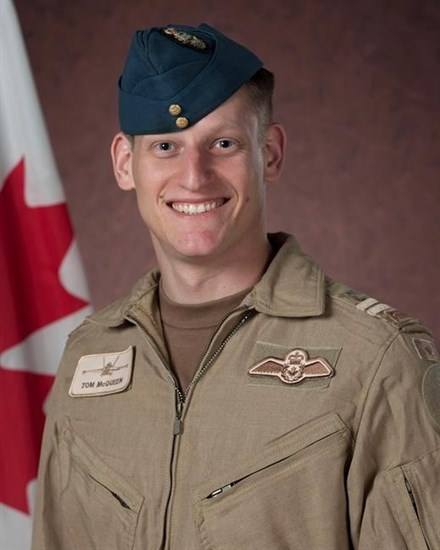
Captain Thomas McQueen is shown in this undated handout image. The pilot who died in the crash of a CF-18 fighter jet near the Alberta-Saskatchewan boundary has been identified as McQueen.
Image Credit: THE CANADIAN PRESS/HO-Canadian Armed Forces Imagery
November 29, 2016 - 12:08 PM
COLD LAKE, Alta. - A pilot killed when his CF-18 fighter jet crashed during a routine training exercise near the Alberta-Saskatchewan boundary is being remembered as a dedicated airman who served overseas and once helped escort Santa on a Christmas delivery mission.
Capt. Thomas McQueen, 29, from the Hamilton area, had been with the military for a decade and was engaged to be married.
He was a member of 401 squadron at 4 Wing Cold Lake in northeastern Alberta.
"I can tell you first-hand how much of an incredible person he was and that he was dedicated to the service of Canada," Col. Paul Doyle, commanding officer of the base, told reporters Tuesday.
Doyle said he had been one of McQueen's instructors and had tremendous respect for the pilot.
"His energy and dedication caused him to be recognized as the leader among his peers. He will be, and is, forever missed."
McQueen's single-seat fighter went down Monday morning on the Saskatchewan side of the Cold Lake Air Weapons Range. McQueen was flying with another plane in an air-to-ground attack simulation, said Doyle.
He did not provide details of the crash, including whether McQueen was able to eject from the plane. An investigation is underway to determine what went wrong.
"It is still very raw for us and we will find out what did happen," Doyle said.
"Operating a supersonic fighter aircraft in dynamic manoeuvring is not something that we take lightly," he added. "We make sure we train ourselves and prepare ourselves to the highest standards of professionalism."
McQueen was born and raised in Fisherville, Ont., just south of Hamilton, said Lyn Raynor, a neighbour of the family.
"He never wanted to be anything but a pilot since he was a young boy," she said.
"Will miss my big brother," Aaron McQueen wrote on Twitter, declining a phone interview. "So proud of him."
McQueen had served in eastern Europe on the NATO mission Operation Reassurance and had combat flight time in the Middle East on Operation Impact in Iraq, said Doyle.
In a 2014 press release, the military listed Capt. Thomas "Toast" McQueen as one of the few pilots selected that year to keep a watchful eye on Santa's sleigh as part of its annual Santa tracker mission.
An attached photo shows a grinning McQueen in a red Santa cap kneeling on a snow-covered tarmac in front of a CF-18.
"His sacrifice will be remembered by all Canadians," Prime Minister Justin Trudeau said in a statement. "This accident is another painful reminder of the dangers that members of the Canadian Armed Forces face every day to ensure the safety and security of our citizens."
Gen. Jonathan Vance, chief of the defence staff, offered his sympathies to McQueen's comrades in Cold Lake.
"Every day, members of the Canadian Armed Forces prepare themselves for the responsibility of shielding their fellow citizens from harm," Vance said in a statement. "That training is both rigorous and demanding. It has to be."
About 10 pilots have died in CF-18 crashes since the military first bought the jets in 1980.
In 2003, Capt. Kevin Naismith was killed when the CF-18 he was flying went down during an international training exercise on the Cold Lake range. In 1995, Capt. Richard Bailey died when his CF-18 also crashed on the range.
The federal government has said many of the force's aging CF-18s are out of service on any given day because of maintenance issues. Ottawa is preparing to negotiate the purchase of 18 new Super Hornet fighter jets that it says it needs until a competition to replace the CF-18s can be finished.
The Air Force announced last week that all 77 of Canada's CF-18s will be able to fly until 2025.
— By Chris Purdy in Edmonton
News from © The Canadian Press, 2016